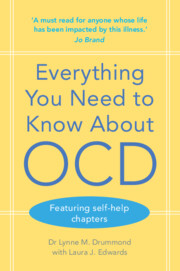Book contents
- Everything You Need to Know about OCD
- Reviews
- Everything You Need to Know about OCD
- Copyright page
- Contents
- Preface
- Acknowledgements
- 1 What Is OCD and Is It Really a Problem?
- 2 Who Gets OCD and How Would Anyone Know if They Had It?
- 3 Types and Presentation of OCD
- 4 Drug Treatment
- 5 Exposure and Response Prevention for OCD
- 6 Children and Adolescents with OCD
- 7 Old Treatments, Modern Developments, New Research, and Potential Treatments for the Future
- 8 Other Conditions Which Appear Similar to OCD
- 9 What Can Family and Carers Do to Help a Person with OCD?
- 10 What Can You Do to Help Cope with Your OCD?
- 11 General Principles of Treatment
- 12 How to Better Manage Your Symptoms Before and During Treatment
- 13 Overcoming Fears of Contamination
- 14 Fear of Harm to Self or Others Due to Failure to Act
- 15 Fear of Harm to Self or Others Due to Your Own Actions (or Thoughts)
- 16 Overcoming ‘Taboo’ Obsessive Thoughts
- 17 Loss of Something (Objects or Part of ‘Self’)
- 18 Overcoming Obsessive-Compulsive Slowness, Perfectionism and Symmetry
- 19 Overcoming Obsessive Ruminations (Sometimes Known as ‘Pure O’)
- 20 When the Treatment Doesn’t Go According to Plan or Even If It Does, What to Do Next
- Appendix
- Glossary
- Resources
- References
- Index
4 - Drug Treatment
Published online by Cambridge University Press: 27 May 2022
- Everything You Need to Know about OCD
- Reviews
- Everything You Need to Know about OCD
- Copyright page
- Contents
- Preface
- Acknowledgements
- 1 What Is OCD and Is It Really a Problem?
- 2 Who Gets OCD and How Would Anyone Know if They Had It?
- 3 Types and Presentation of OCD
- 4 Drug Treatment
- 5 Exposure and Response Prevention for OCD
- 6 Children and Adolescents with OCD
- 7 Old Treatments, Modern Developments, New Research, and Potential Treatments for the Future
- 8 Other Conditions Which Appear Similar to OCD
- 9 What Can Family and Carers Do to Help a Person with OCD?
- 10 What Can You Do to Help Cope with Your OCD?
- 11 General Principles of Treatment
- 12 How to Better Manage Your Symptoms Before and During Treatment
- 13 Overcoming Fears of Contamination
- 14 Fear of Harm to Self or Others Due to Failure to Act
- 15 Fear of Harm to Self or Others Due to Your Own Actions (or Thoughts)
- 16 Overcoming ‘Taboo’ Obsessive Thoughts
- 17 Loss of Something (Objects or Part of ‘Self’)
- 18 Overcoming Obsessive-Compulsive Slowness, Perfectionism and Symmetry
- 19 Overcoming Obsessive Ruminations (Sometimes Known as ‘Pure O’)
- 20 When the Treatment Doesn’t Go According to Plan or Even If It Does, What to Do Next
- Appendix
- Glossary
- Resources
- References
- Index
Summary
This chapter starts by examining how, in the 1970s, the discovery that clomipramine, a drug used to treat depression, can greatly improve the symptoms of OCD led to the development of the ‘serotonin’ theory of OCD. Although clomipramine works well with OCD symptoms, it does have a number of potential side effects. The development of newer drugs which act on the same parts of the brain but have fewer side effects – that is, selective serotonin reuptake inhibitors (SSRIs) – will then be discussed in ‘Serotonin Reuptake Inhibiting Drugs’ later in this chapter. This section will examine the possible benefits of these drugs and also discuss potential side effects as well as whether they are addictive and whether they can alter someone’s personality.
The chapter will then explore the options for people who have OCD which does not respond to SSRIs or clomipramine, examining two main approaches to this problem. The role of dopamine blocking agents in OCD will be described, including discussion of how these act on a different part of the brain compared to SSRIs and clomipramine. We will then explore how some people with OCD fail to respond to the normally prescribed dosages of SSRIs but may respond to higher dosages. This needs to be undertaken carefully and with the close supervision of an expert.
The final part of this chapter will examine new research in the area which may be helpful for the future, including the possible role of drugs acting on the glutamatergic system of the brain.
Medication can improve the symptoms of OCD in six out of ten people. The first drugs that are likely to be given to someone with OCD are those which act on the serotonin system (see ‘What Are the Advantages and Disadvantages of Medication and Exposure and Response Prevention?’). These drugs include clomipramine, which is an older drug, and the newer SSRIs.
- Type
- Chapter
- Information
- Everything You Need to Know About OCD , pp. 45 - 64Publisher: Cambridge University PressPrint publication year: 2022

